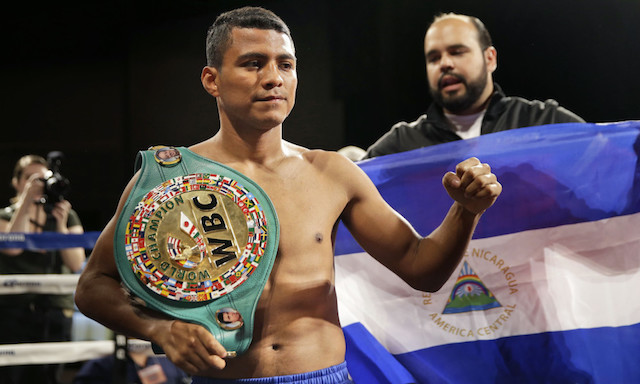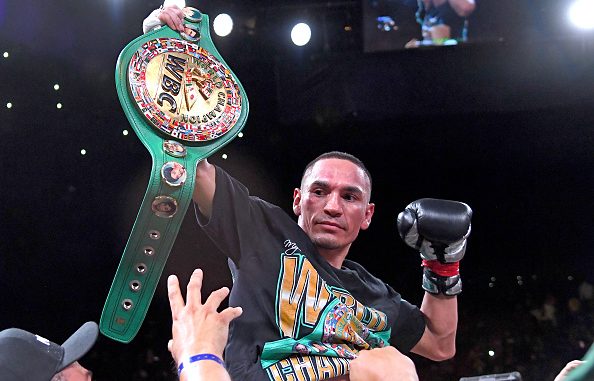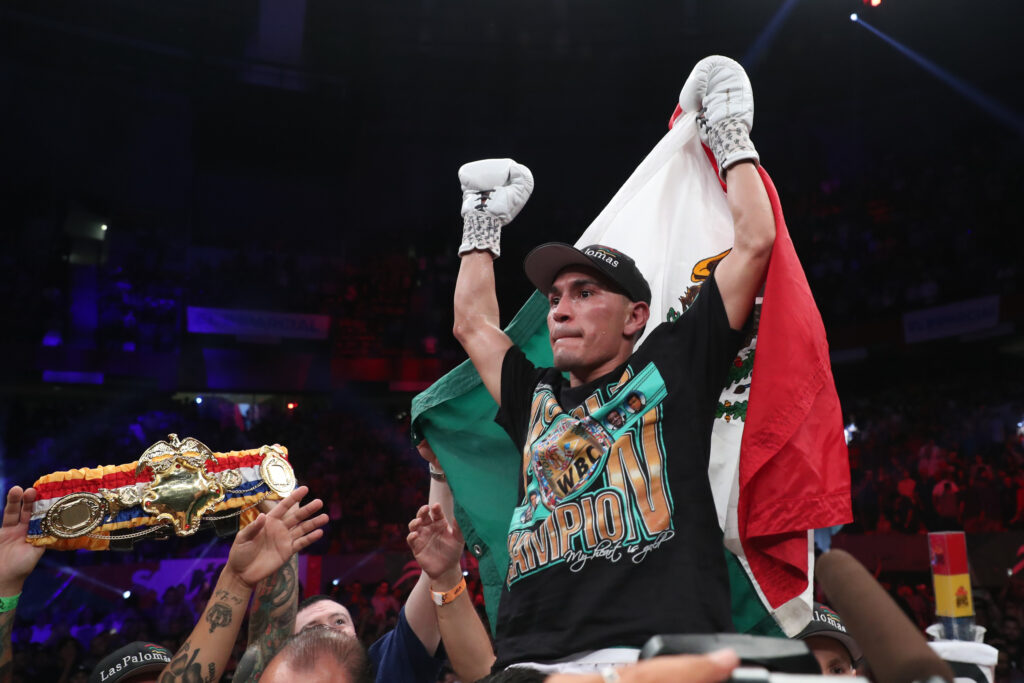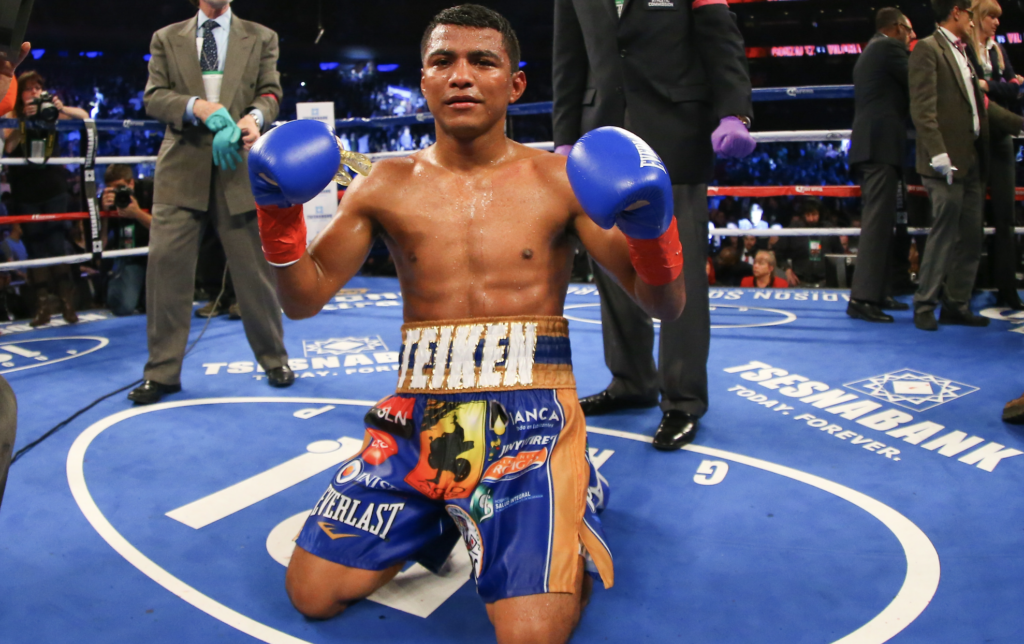Loss and tragedy have stalked the lives and careers of Juan Francisco Estrada and Roman Gonzalez. But the duo’s refusal to bow to circumstance or let tragedy define them is an eloquent reflection of the best boxing has to offer, argues Luke G. Williams…
The inevitability of death and accepting the loss of loved ones is a rite of passage we all go through – hopefully later rather than sooner.
In that respect, the lives of Roman Gonzalez and Juan Francisco Estrada are no different to those of you and I.
Nevertheless, the way that both men have dealt with the often capricious hands that fate has dealt them serves as an example and an inspiration to us all.
As Gonzalez – the man from a barrio named Esperanza (‘Hope’) in Managua, Nicaragua once said: “You have to keep looking to the future and pray to God that our lives can get better, especially those going through difficult times. I always have a desire to keep moving forward.”
The duo’s lives and careers also serve as a reminder that boxing is a sport which offers the opportunities to young men and women from the most desperate of circumstances and most humble and poverty-stricken of backgrounds, to not only become role models, but also national icons.

The respectful rivalry between Gonzalez and Estrada was borne eight years ago in the raucous and rowdy environs of the Memorial Sports Arena in Los Angeles.
Back then, Estrada was a 22-year-old in his first world title fight while Gonzalez was only 25 but a comparative veteran, having already participated in eight world title contests. Gonzalez’s WBA light-flyweight title was on the line that night, and he retained it via unanimous decision, but only after a bout that was as punishing as it was thrilling, as intense as it was bruising.
They’ll meet again this Saturday.
And once again their destinies will be entwined.
***
“At some point something bad has to happen, because life is not all happiness,” says Estrada at the beginning of the stirring documentary short ‘El Gallo’. “They are tests that God sends us. It’s something you need to learn how to overcome. One must learn to endure pain.”
Estrada discovered the harsh reality of the inexorable connection between pain and existence at an early age.

“My childhood was pretty difficult,” he reflected. “At the age of seven I lost my mother. She died of leukaemia. I’m not going to see her again. It was terrible … My aunt knew that my mother was dying and she decided she would raise me and my siblings.”
As it has proved for so many of his fellow working-class Mexicans, boxing provided a refuge for the young Estrada, as he grew up in ‘The City of the Sun’, Hermosillo in Sonora state.
“I first started boxing when I was nine years old. One day I was walking home from school. I was walking down the same road I always did. I saw a father and son training under a tree. I asked the man if he could teach me how to box. The man said: ‘I’m not a coach, but I can show you a few things.’
“The next day I started training with him. The only equipment he had was a sack hanging from a tree. A few months later he met a boxing coach who had a gym in Puerto Penasco. His name was Juan Carlos Gonzalez. But everyone knew him as Don Juan. He told Don Juan, ‘These kids show a lot of promise. They have what it takes to be great boxers.’
“Don Juan was a very noble person. He was also very strict. He always wanted the best out of us. When you stepped foot in the gym there was no chatting. He didn’t want us to be screwing around, no partying or drinking. He always expected our very best. If you did 100 sit-ups you’d better do 200. He was always pushing our limits.
“As a child I liked that discipline, I would do what he said. Don Juan was a very disciplined person. All of his training was based on physical and mental strength. I think that’s why my mind and body are so strong. As a kid I remember winning 40, 50 fights without losing, I would knock these kids out because I was training so hard. He made me that way.”

The dedication and single-mindedness installed in Estrada by Don Juan held him in good stead when, aged 14, tragedy struck again.
“My father died. My biological father. I never lived with him but he was my father and, of course, I felt the pain of it.”
Estrada channelled his pain and frustration into his boxing, winning three national amateur titles and picking up a nickname that has stayed with him ever since.
“There was an article in the newspaper about me. The headline was ‘The Fighting Rooster’. My trainer Don Juan started calling me ‘the Rooster’ [and said] we’re going to name you ‘El Gallo’. From that point on everyone would call me ‘El Gallo’.”
In 2008, Estrada turned pro. He was just 18 years old. By February of 2011 he was 18-0 and progressing rapidly up the rankings. But then a young man whose life had already been haunted by death once again suffered the heartbreak of bereavement when his beloved aunt died.
“I was devastated. She was my second mother. Her death was unexpected as she was hit by a car. She was hit so hard they say she died on impact. They didn’t even bother taking her to the hospital. By the time I got there she was already covered. All of that was and is very difficult for me.”
The first time Estrada entered the ring after his aunt’s death – to face Juan Carlos Sanchez Jr in May 2011 – he surprisingly lost on points.
It would have been easy for him to fade away after that. To become just another name on Boxrec who woulda, shoulda, coulda.
But – demonstrating the bloody-minded determination that would characterise his career over the next decade – ‘El Gallo’ refused to yield.
***
By the summer of 2011, when Estrada’s career prospects were in the balance. Roman ‘Chocolatito’ Gonzalez was already a garlanded and heroic figure in his native Nicaragua and a two-weight world champion, having won WBA titles at minimumweight and light-flyweight.
But he was also nursing heartbreak of his own, after the violent and shocking death of his hero and mentor, the great Alexis Arguello in July 2009.
Arguello is a name that resonates throughout modern boxing folklore and looms large in the recent history of Nicaragua. It’s fair to say that Gonzalez has followed with distinction and grace the path originally forged by his idol, mentor and former trainer.
In the course of his 57 years on earth, Arguello transcended the abject poverty of Managua, blasting his way to world titles at featherweight, super-featherweight and lightweight, before also attaining political office as Mayor of his home city.
Sadly, life ended in tragic and shockingly violent circumstances for El Flaco Explosivo (‘The explosive thin man’) on 1 July 2009 when a bullet ripped through his heart. An autopsy ruled the death to be suicide.
Even today Gonzalez admits he finds Arguello’s passing hard to comprehend and accept. “When the tragedy struck, I was running on a track,” he told this author in 2019. “When a gentleman told me that Alexis had ended his life, I couldn’t believe it, as he was such a strong man. The news was very difficult to swallow, no one could believe it.
“We all admired him, we saw him as an immortal. You expect someone like him to die old. God only knows why he did what he did. But although Alexis is no longer in the gym with us, he is always with us in spirit. His words of wisdom remain with us.
“He provided us with the example to follow our dreams and become champion of world, he showed us the only way is to fight and work hard to achieve good things in life.”

Arguello was with Gonzalez almost from the beginning, back in the days when ‘Chocolatito’, encouraged by his father Luis, began to box. His family was so poor he had to borrow boxing gloves from a local electrical worker called Gustavo because he didn’t own his own set.
Thoughts of those early days in Managua often inspire Gonzalez to engage in vivid reverie. “I would fight in shows that Arguello would put on every 15 days,” he recalled. “We fought for hampers of food, which was extra motivation for us youngsters. In 2004, I became [amateur] champion of Central America in Costa Rica. That was a special moment which I won’t forget. I had 87 fights as an amateur, and I had no rivals, I beat all the youngsters during that time.”
It was Arguello who coined Gonzalez’s iconic nickname. “In Nicaragua it’s customary to have a nickname. Alexis gave me the name ‘Chocolatito’, due to my mixed race ‘mestizo’ background.”
It was also Arguello who helped forge Gonzalez’s remarkable pressure fighting style.
“Alexis was very demanding,” Gonzalez admits. “I trained like he did when he was in his heyday. Alexis wanted me to achieve good results, he was a good man with people, likeable, relaxed, but you had to do things his way.
“He was dedicated to his work, a perfectionist, but he taught me a lot. I’m proud and it was blessing to know Arguello and learn many qualities from him. Many things he taught me. To follow in the footsteps of a great fighter such as Arguello was a great honour for me.”
Gonzalez first fought as a pro at 18. It was not, at the time, a decision Arguello agreed with.
“Alexis was against it as he wanted me to go to the [Beijing] Olympics but there were three years to go,” Gonzalez explains. “My first pro fight [in 2005] I got 1,500 pesos – about 50 dollars! It was a tough experience to hit and not to be hit, things are different in the pro game.”
By the time of Arguello’s tragic and untimely death, Gonzalez was already a minimumweight world champion; indeed, just two weeks after Arguello died, he would dominate Katsunari Takayama in his second defence of the WBA 105lbs crown.
With Arguello gone, the second major mentor of Chocolatito’s career, trainer Arnulfo Obando, took centre stage.
World titles at three further weights and widely acknowledged status as the best boxer in the world would follow.
But so would more tragedy.
***
“When I train, when I fight, I think of my family even though they’re no longer here,” is how Estrada has explained his mental approach to boxing. “I think about my brothers and I hope that by doing what I do, I will be able to help them.
“When I train I prepare my mind first before going into the ring I simply think positive thoughts. I tell myself: I will win, I will win. If your mind is positive your body will react positively I think this is what differentiates me from the rest.”
After the death of his aunt and his points loss to Sanchez Jr in early 2011, Estrada embarked on a manic schedule of five further fights before the year was out – culminating in a rematch with his conqueror which he won via an impressive tenth-round TKO.
Three more wins in 2012 followed and then came the opportunity Estrada had been yearning for. A world title shot – against Roman Gonzalez. Although Estrada had been campaigning at flyweight, he was happy to move down in weight for a world title shot.
“It was my first attempt at a world title,” he later said. “I dropped down from flyweight to fight at 108 pounds. No one wanted to fight him at that time. Estrada did not topple Gonzalez, losing via a unanimous decision, but he gave the Nicaraguan arguably the toughest fight of his career up to that point.
“El Gallo’ is very strong, like all Mexicans,” Gonzalez later said, in a handsome tribute to his opponent. “It was a great fight, very difficult but great for the fans. Estrada has his qualities and great combinations. It was a hard fight for both of us, and he demonstrated excellent qualities.”
“It was a great fight,” Estrada recalled earlier this year with a smile. “I think that’s why people have been asking for the rematch for the last eight years.”
***
Since the first Gonzalez-Estrada fight in 2012, both men have experienced further peaks and troughs in their lives and careers.
Estrada used the momentum and confidence gained from pushing Gonzalez so close to propel him to defeat WBA and WBO flyweight ruler Brian Viloria in his very next fight. He would defend those titles on five occasions from 2013-15.
Gonzalez enjoyed a flyweight world title reign of his own from 2014-16, but a rematch between the two men at 112lbs never came off.
Seeking a world title in a fourth weight class – one more than his hero Arguello managed – Gonzalez instead moved up to super-fly in 2016, defeating Carlos Cuadras for the WBC title.
By this point, ‘Chocolatito’ was widely regarded as the world’s best P4P fighter. However, just as his career was at his peak, things started to go wrong.
Firstly, his 54-year-old trainer Arnulfo Obando suffered a stroke and died, and then Gonzalez lost his precious unbeaten record to Srisaket Sor Rungvisai via a close and debatable majority decision. (According to Compubox stats, Gonzalez outlanded Srisaket in ten of the 12 rounds). Gonzalez was philosophical about the loss in the ring, but outside of it he still mourns Obando.
“You can’t compare Arnulfo to anyone. He was unique, there was no one like him. He put lots of passion into his training, he would study my rivals and gave me confidence during training and fights. He would cook for me, we slept together, I was his son and he was my father. We went through the good and bad times together, it has never been the same since his passing. I’ll never forget him.”
When Gonzalez lost a rematch to Srisaket via a devastating fourth-round knockout in September 2017, his career at the highest level looked over and Estrada-Chocolatito 2 looked in danger of being a great fight that got away.
Gradually, however, destiny drew the duo together again.
After two fierce battles of his own with Srisaket, Estrada emerged with the mantle of WBC super-flyweight champion, while Gonzalez mounted an incredible comeback, bouncing back from the death of Obando and myriad injury issues to defeat Kal Yafai for the WBA 115lbs title in 2020.
Estrada and Gonzalez were now both world title holders in the same division again and – eight long years after they first met – a rematch finally beckoned.
The road to this showdown has been a long and sometimes circuitous one, during which both men have experienced more than their fair share of tragedy and disappointments.
But they are both still here, standing strong, standing proud, and ready to inspire us all over again on Saturday night.
NB: Juan Francisco Estrada quotes are from the documentary ‘El Gallo’, Roman Gonzalez quotes from interviews with the author.
